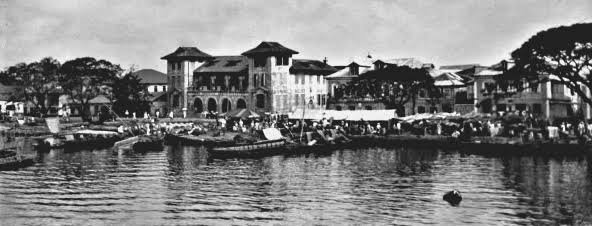.jpg)
Source: https://goo.gl/images/uxXzA6
The British showed a keen interest in West Africa in the second half of the last century. They wanted to stamp out slave trade and slavery, and to introduce lawful trade in other valuable goods.
It is to the credit of the British that, having taken a leading part in the slave trade, they tried to stop it in all earnest.
.jpg)
Source : https://goo.gl/images/84jLC6
Two places which remained stubborn were Dahomey and Lagos. During a good part of the nineteenth century there were civil wars in Yoruba land. Many slaves were captured in these wars and brought down to Lagos markets.
This is why Lagos remained unwilling to give up the slave trade. As Kosoko, who had seized the throne of Lagos from his uncle, would not give up the trade in slaves, the British attacked and burnt the city in 1851.

Source : https://goo.gl/images/JyW2Gt
kosoko was forced out of Lagos, and Akintoye, the rightful ruler, was re- stated. King Akintoye promised to stop the slave trade, for this was the condition on which the British helped him.
He was, however, unable to stop the trade completely before his death in 1853. His son and successor, Dosumu, had to fight hard, with the help of the British, to maintain his position as ruler of Lagos.
Like his father, he was unable to stop the slave trade entirely and was under constant threat by Kosoko. Therefore, the British government took Lagos and declared it a colony in 1861, ten years after the city had been bombarded.
.jpg)
Source : https://goo.gl/images/ef6jsR
For transferring his political power, Dosumu received a pension worth about £1,030 a year. Two years after the British had taken Lagos, Kosoko, too, accepted a pension in return for surrendering palma and lekki to the British.
These were added to Lagos, which had become known the previous year as the Colony of Lagos. A governor was appointed to replace the consul.
In 1886 Lagos Colony was separated from Ghana.